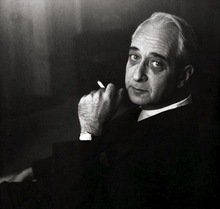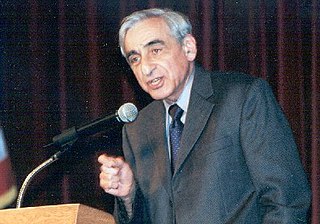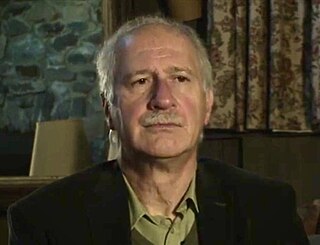
A genre of arts criticism, literary criticism or literary studies is the study, evaluation, and interpretation of literature. Modern literary criticism is often influenced by literary theory, which is the philosophical analysis of literature's goals and methods. Although the two activities are closely related, literary critics are not always, and have not always been, theorists.

Matthew Arnold was an English poet and cultural critic. He was the son of Thomas Arnold, the headmaster of Rugby School, and brother to both Tom Arnold, literary professor, and William Delafield Arnold, novelist and colonial administrator. He has been characterised as a sage writer, a type of writer who chastises and instructs the reader on contemporary social issues. He was also an inspector of schools for thirty-five years, and supported the concept of state-regulated secondary education.

An intellectual is a person who engages in critical thinking, research, and reflection about the reality of society, and who proposes solutions for its normative problems. Coming from the world of culture, either as a creator or as a mediator, the intellectual participates in politics, either to defend a concrete proposition or to denounce an injustice, usually by either rejecting, producing or extending an ideology, and by defending a system of values.

"The Two Cultures" is the first part of an influential 1959 Rede Lecture by British scientist and novelist C. P. Snow which were published in book form as The Two Cultures and the Scientific Revolution the same year. Its thesis was that science and the humanities which represented "the intellectual life of the whole of western society" had become split into "two cultures" and that this division was a major handicap to both in solving the world's problems.

The London Review of Books (LRB) is a British literary magazine published bimonthly that features articles and essays on fiction and non-fiction subjects, which are usually structured as book reviews.

Lionel Mordecai Trilling was an American literary critic, short story writer, essayist, and teacher. He was one of the leading U.S. critics of the 20th century who analyzed the contemporary cultural, social, and political implications of literature. With his wife Diana Trilling, whom he married in 1929, he was a member of the New York Intellectuals and contributor to the Partisan Review.

Terence Francis Eagleton is an English literary theorist, critic, and public intellectual. He is currently Distinguished Professor of English Literature at Lancaster University.

Frank Raymond "F. R." Leavis was an English literary critic of the early-to-mid-twentieth century. He taught for much of his career at Downing College, Cambridge, and later at the University of York.

Michael Laban Walzer is an American political theorist and public intellectual. A professor emeritus at the Institute for Advanced Study (IAS) in Princeton, New Jersey, he is editor emeritus of Dissent, an intellectual magazine that he has been affiliated with since his years as an undergraduate at Brandeis University. He has written books and essays on a wide range of topics—many in political ethics—including just and unjust wars, nationalism, ethnicity, Zionism, economic justice, social criticism, radicalism, tolerance, and political obligation. He is also a contributing editor to The New Republic. To date, he has written 27 books and published over 300 articles, essays, and book reviews in Dissent, The New Republic, The New York Review of Books, The New Yorker, The New York Times, Harpers, and many philosophical and political science journals.
Culture and Anarchy: An Essay in Political and Social Criticism is a series of periodical essays by Matthew Arnold, first published in Cornhill Magazine 1867–68 and collected as a book in 1869. The preface was added in 1869.

Sir John Frank Kermode, FBA was a British literary critic best known for his 1967 work The Sense of an Ending: Studies in the Theory of Fiction and for his extensive book-reviewing and editing.
Karl Fergus Connor Miller FRSL was a Scottish literary editor, critic and writer.

John Carey, is a British literary critic, and post-retirement (2002) emeritus Merton Professor of English Literature at the University of Oxford. He is known for his anti-elitist views on high culture, as expounded in several books. He has twice chaired the Booker Prize committee, in 1982 and 2003, and chaired the judging panel for the first Man Booker International Prize in 2005.
Michael Bérubé is Edwin Erle Sparks Professor of Literature at Pennsylvania State University, where he teaches American literature, disability studies, and cultural studies. He is the author of several books on cultural studies, disability rights, liberal and conservative politics, and debates in higher education. From 2010 to 2017, he was the Director of the Institute for the Arts and Humanities at Penn State; from 1997 to 2001 he was the founding director of the Illinois Program for Research in the Humanities. He was the 2012 president of the Modern Language Association, and served as vice president from 2010–2011. He served two terms on the National Council of the American Association of University Professors from 2005 to 2011, and three terms on the AAUP's Committee A on Academic Freedom and Tenure from 2009 to 2018. He was a member of the International Advisory Board of the Consortium of Humanities Centers and Institutes for two terms, 2011-2017. Bérubé was named a University Scholar for research at the University of Illinois in 1995 and was awarded the Faculty Scholar medal for research from Penn State in 2012.
David Bromwich is Sterling Professor of English at Yale University.

Martin Evan Jay is an American intellectual historian whose research interests connected history with the critical theory of the Frankfurt School, social theory, cultural criticism, and historiography.

Edward Wadie Said was a Palestinian-American philosopher, academic, literary critic, and political activist. As a professor of literature at Columbia University, he was among the founders of post-colonial studies. As a cultural critic, Said is best known for his book Orientalism (1978), a foundational text which critiques the cultural representations that are the bases of Orientalism—how the Western world perceives the Orient. His model of textual analysis transformed the academic discourse of researchers in literary theory, literary criticism, and Middle Eastern studies.
Morris Dickstein was an American literary scholar, cultural historian, professor, essayist, book critic, and public intellectual. He was Distinguished Professor Emeritus of English at CUNY Graduate Center in New York City.
Donald Norman Winch, was a British economist and academic. He was Professor of the History of Economics at the University of Sussex from 1969 to 2000, and its Pro-Vice-Chancellor from 1986 to 1989.
Seamus Perry is an English author, academic, a Fellow and Tutor of Balliol College, Oxford and, since 2014, a Professor of English Literature in the English Faculty at the University of Oxford.












